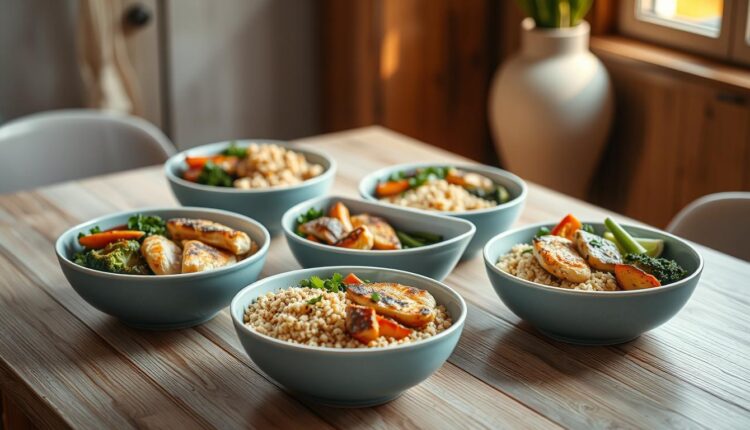High Protein Lunch Prep Meal Bowls With Balanced Macros
Transform your lunch routine with high protein lunch prep meal bowls. Follow our step-by-step guide for balanced, prep-ahead meals.
As someone who’s juggled restaurant kitchens and family dinners, I’ve learned one truth: sustaining energy starts with smart planning. That’s why I’m obsessed with creating nutrient-dense, grab-and-go options that balance taste and nutrition. Think tender shredded chicken over fluffy rice, paired with crisp veggies—all prepped in under 90 minutes for the week ahead.
This approach isn’t about rigid diets or Instagram-perfect containers. It’s a practical system for anyone craving variety without chaos. You’ll discover how simple swaps—like using quinoa instead of white rice or adding lentils for plant-based power—can transform your routine. Best part? These combos keep you satisfied longer, thanks to intentional ratios of carbs, fats, and yes—plenty of that muscle-fueling macronutrient we all need.
Key Takeaways:
- Balanced macros mean steady energy (no 3 p.m. crashes)
- Batch-friendly recipes that adapt to dietary needs
- Unexpected flavor combos using pantry staples
Introduction to High Protein Lunch Prep Meal Bowls
Mastering the art of quick, nutritious meals starts with understanding the bowl method. Think of it as a customizable canvas: a base, a protein star, and vibrant toppings. This approach lets you mix textures and flavors while keeping macros in check—no culinary degree required.
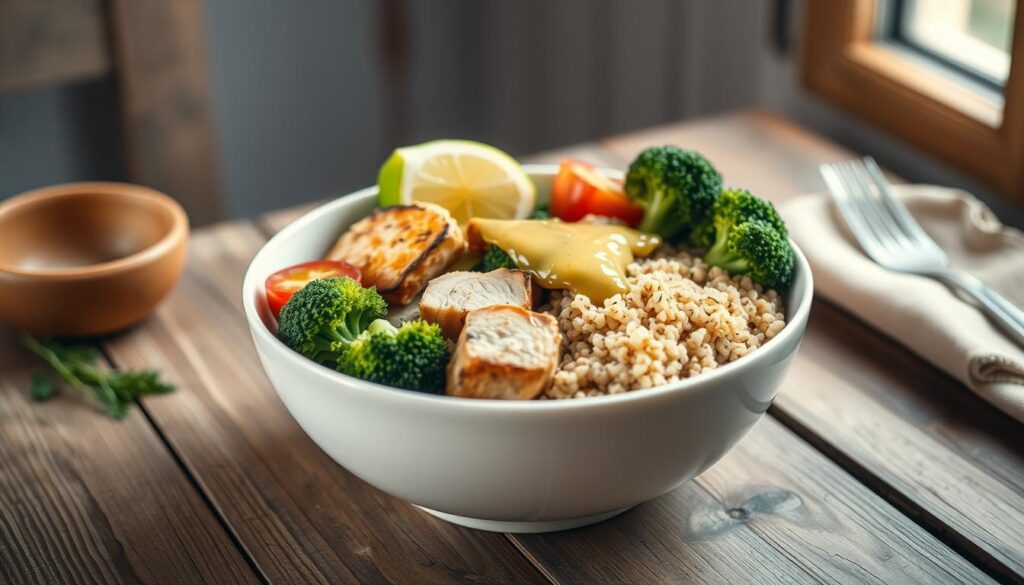
Why spend Sunday afternoons chopping and roasting? Because batch cooking transforms chaotic weekdays. Imagine opening your fridge to ready-made components—like seasoned ground turkey, roasted sweet potatoes, and garlicky greens. You’ll assemble lunch faster than ordering takeout.
Three elements make these combos work:
- Lean proteins: Chicken breast, shrimp, or lentils
- Crunchy veggies: Snap peas, shredded cabbage, or bell peppers
- Flavor boosters: Citrus dressings, toasted seeds, or chili flakes
I learned this system during my busiest catering years. One client demanded gluten-free, dairy-free options—without sacrificing taste. We nailed it using fresh ingredients and smart prep. Now, I’ll show you how to do the same.
Ready to build your first creation? Let’s break down each layer step-by-step.
The Benefits of Meal Prep for Protein-Powered Lunches
Let’s talk about transforming chaotic evenings into calm victories. A well-stocked fridge with prepped components isn’t magic—it’s strategy. During a catering gig for a tech startup, I watched employees swap sad desk salads for vibrant bowls packed with seasoned turkey and roasted veggies. Their secret? Twenty minutes of Sunday planning.
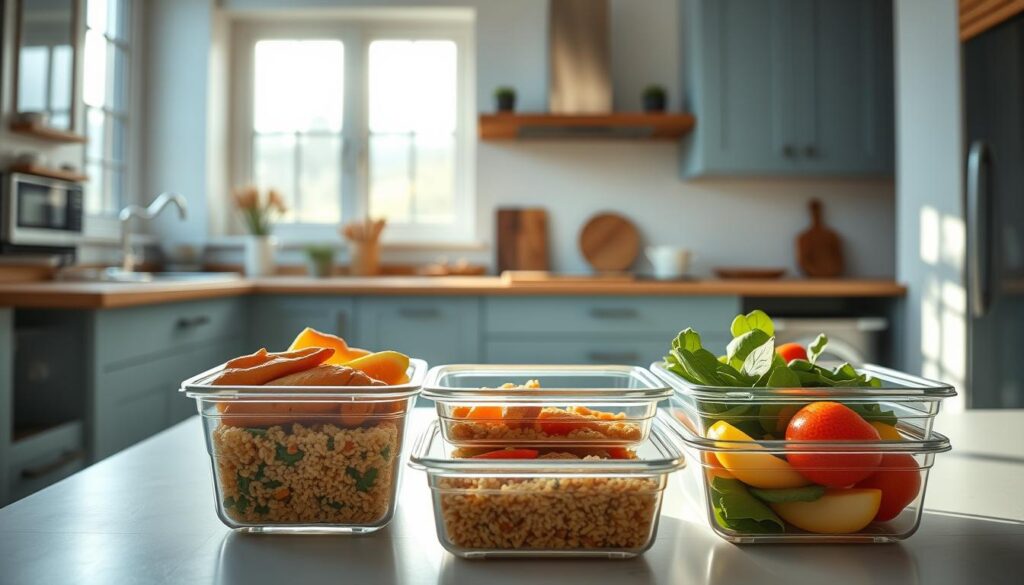
Streamlining Your Weeknight Routine
Batch cooking turns “What’s for dinner?” into a solved equation. Try this:
| Without Prep | With Prep |
|---|---|
| 45-min daily cooking | 5-min assembly |
| Last-minute takeout | Cost-effective meals |
| Decision fatigue | Grab-and-go options |
Roast two sheet pans of veggies while simmering ground meat with garlic. Store components separately—you’ll create five unique combinations in the time it takes to reheat leftovers.
Achieving Balanced Macros for Energy
Smart prep ensures every bite works for you. I guide clients to use this ratio:
- 40% complex carbs (quinoa, sweet potatoes)
- 35% lean protein (chicken thighs, shrimp)
- 25% healthy fats (avocado, olive oil)
One parent told me her energy crashes vanished when she swapped deli meats for shredded chicken breast in her weekly bowls. “I finally survive soccer practice without caffeine,” she laughed. That’s the power of intentional fueling.
Spend ten extra minutes seasoning your proteins or whisking a zesty dressing. These small acts build meals that keep you sharp through back-to-back meetings or marathon playdates.
Key Ingredients and Flavor Profiles
A client once asked me how to keep her meal rotations exciting. “Start with ingredients that multitask,” I told her. The best bowls balance texture, color, and purpose—every component should earn its place through flavor or function.
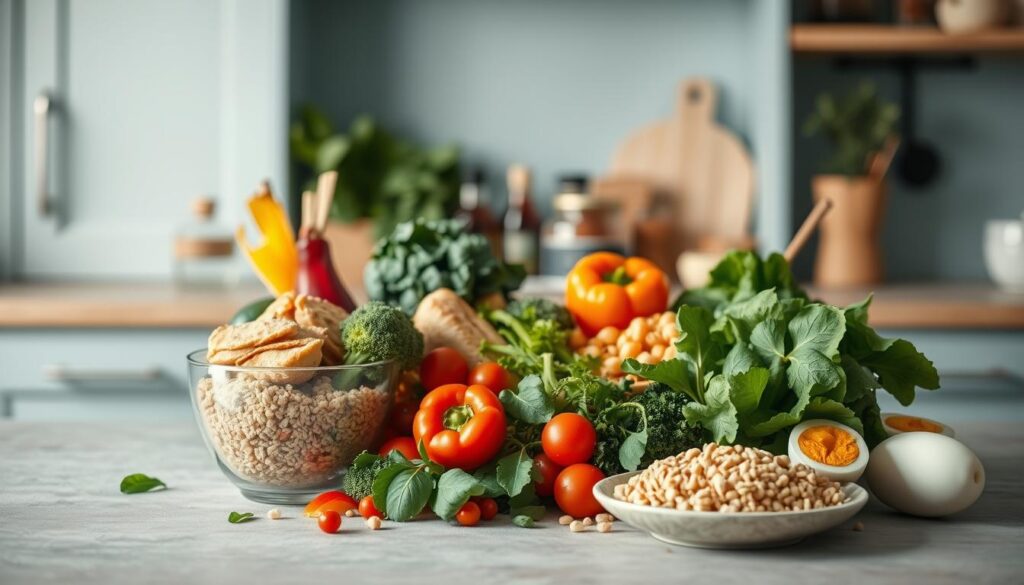
Protein Powerhouses
Your protein choice sets the tone. Shredded chicken breast works like a blank canvas—toss it in harissa paste or lemon-herb marinade. Ground beef shines in Korean-inspired bowls with gochujang glaze. For plant-based options, try crumbled tempeh sautéed with smoked paprika.
Three rules I follow:
- Buy skinless thighs when budget allows—they stay juicy during reheating
- Cook ground turkey with grated zucchini to boost moisture
- Marinate shrimp in garlic and lime for 10 minutes—no more
Carb Foundations
Rice vs cauliflower rice isn’t about “good” or “bad”—it’s about goals. Jasmine rice adds comforting chew to teriyaki beef bowls. Riced cauliflower, when roasted with cumin, gives Tex-Mex chicken bowls a nutty crunch without the carbs.
One catering client’s feedback stuck with me: “I never realized roasted veggies could make riced cauliflower taste decadent.” She’s right—toss it with roasted garlic and parsley for instant depth.
Fresh vegetables are your volume allies. Shredded cabbage or spiralized zucchini bulks up portions while keeping calories in check. The crunch factor? Non-negotiable for satisfaction.
Essential Kitchen Tools and Prep Tips
I’ll never forget the time I burned three batches of chicken in a cheap pan during a meal prep marathon. That’s when I realized: your tools are silent partners in cooking success. Let’s talk about building a kitchen arsenal that works as hard as you do.
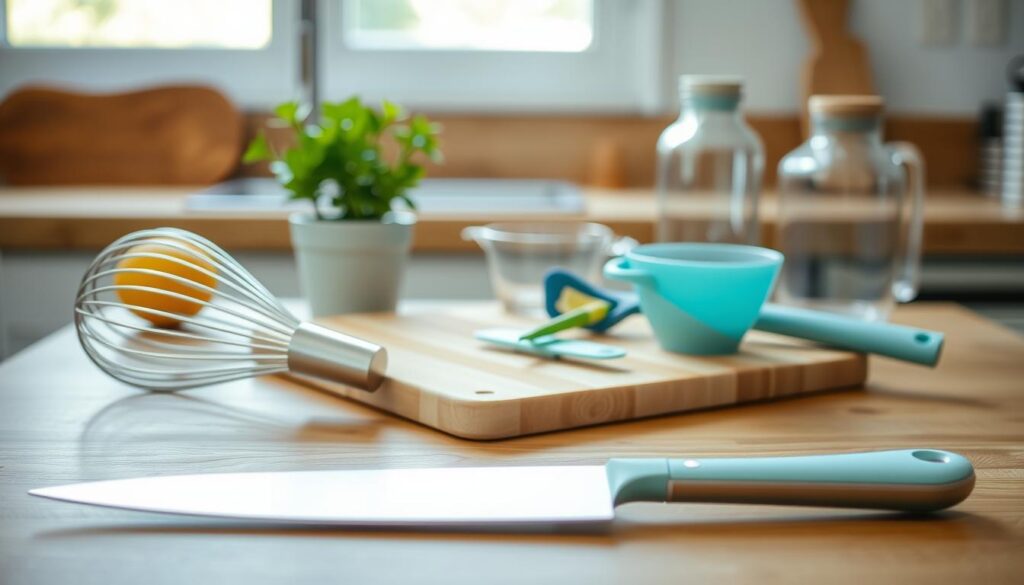
Must-Have Equipment for Quick Cooking
Start with these game-changers:
- Cast iron skillet: Sear proteins perfectly and transitions from stovetop to oven
- Nonstick pan: Ideal for delicate items like eggs or fish
- Measuring spoons: That tablespoon ensures consistent oil portions for balanced macros
During a recent client session, we transformed basic ingredients using just these tools. Sizzling garlic and onion in a well-seasoned skillet created depth in 15-minute stir-fries. A digital kitchen scale became their secret weapon for portion control.
Three maintenance tips I swear by:
- Hand-wash skillets with coarse salt to preserve seasoning
- Replace warped pans—they heat unevenly
- Store knives separately to maintain sharp edges
Your equipment choices don’t need to break the bank. A $12 carbon steel pan outperforms many pricier options. One parent told me her dollar-store measuring spoons lasted longer than her marriage – proof that smart beats fancy every time.
Step-by-Step Cooking Process for Perfect Bowls
Early in my career, I ruined a batch of beef by rushing the browning stage. That mistake taught me more about flavor development than any cooking class. Perfect execution starts with patience—especially when building layers of taste.
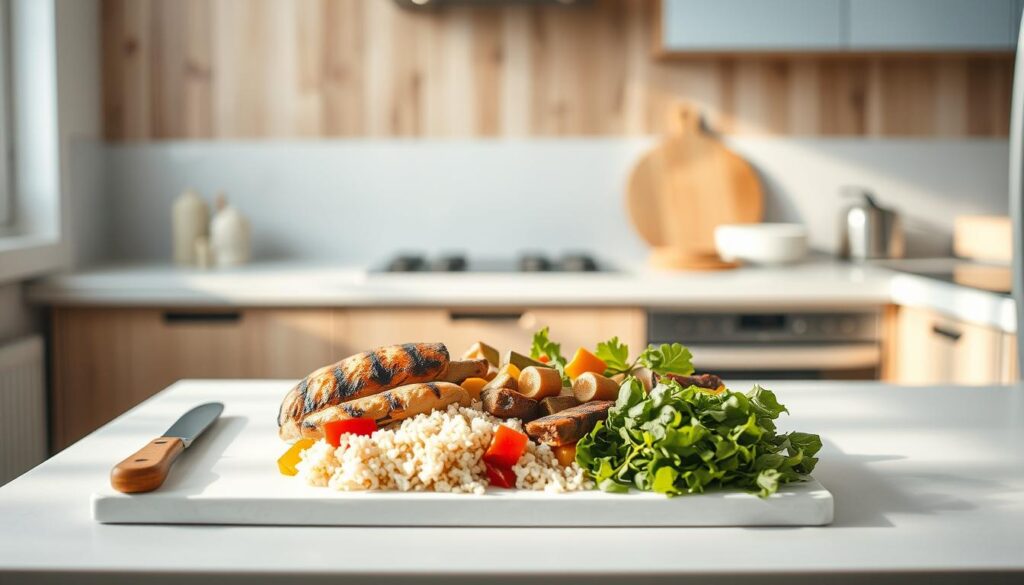
Browning Your Meat to Lock in Flavor
Heat your skillet until water droplets sizzle instantly. Add ground turkey or beef in a single layer—crowding creates steam instead of caramelization. Let it sear untouched for 3 minutes. Flip once, using a metal spatula to scrape up the golden crust (that’s where the magic lives).
Three signs it’s done right:
- Rich brown color covering 70% of the surface
- Juices pooling only slightly when pressed
- Aromatic maillard reaction scent filling your kitchen
Simmering Sauces and Adding Veggies
Deglaze your pan with broth or vinegar after removing the meat. Add sliced mushrooms and garlic, letting them soak up those flavorful bits. Stir in your sauce base—try a mix of tomato paste and smoked paprika for depth.
One client’s “aha moment” came when she let her teriyaki blend simmer for 7 extra minutes. “The sauce clung to every ingredient instead of pooling at the bottom,” she reported. That’s the power of reduced liquids.
Final pro tip: Fold in delicate greens like spinach just before serving. They’ll wilt gently from residual heat without turning mushy. Trust tested recipes from sources like Meal Prep Pro or The Batch Cook Book—their ratios guarantee consistent results.
High Protein Lunch Prep Meal Bowls: Versatile Variations
Last week, a client texted me: “Help—my kids won’t eat the same chicken bowls again!” We transformed their routine by swapping shredded chicken for crispy tofu bites and mango salsa. That’s the beauty of this system—endless reinvention without starting from scratch.
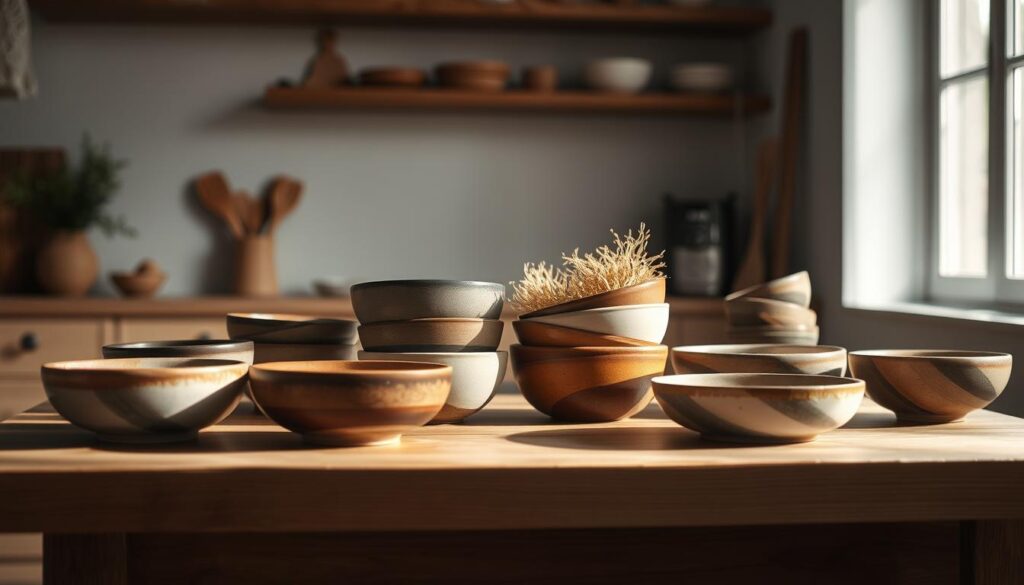
Your base recipe becomes a launchpad. Try these swaps based on dietary needs:
| Dietary Need | Base Swap | Sauce Idea |
|---|---|---|
| Keto | Riced cauliflower | Avocado crema |
| Vegan | Marinated tempeh | Tahini-miso drizzle |
| Gluten-Free | Quinoa blend | Sun-dried tomato pesto |
Macro-friendly bloggers like Fit Foodie Finds prove variety matters. One viral creation combines za’atar-spiced chickpeas with roasted beets and labneh—proof that bold flavors thrive in balanced combinations.
Three rules for successful experimentation:
- Keep one element consistent (like your carb source) to simplify shopping
- Prep sauces separately to maintain texture
- Use color contrast—bright veggies make meals visually appealing
One batch of grilled shrimp becomes three distinct meals: toss with peanut sauce for Thai-inspired creations, mix into citrus-kissed salads, or layer over hummus with roasted peppers. The components stay the same—the magic lies in assembly.
Remember: nutritional balance doesn’t mean bland repetition. As meal prep guru Lisa Bryan says, “Your containers should excite you when you open the fridge.” Start with small tweaks—you might discover your new favorite combination.
Delicious Sauce and Flavor Booster Options
The secret to transforming basic ingredients into crave-worthy meals lies in your sauce game. I once watched a client’s teenager devour broccoli after we drizzled it with pineapple-spiked teriyaki—proof that flavor bridges gaps between nutrition and enjoyment.
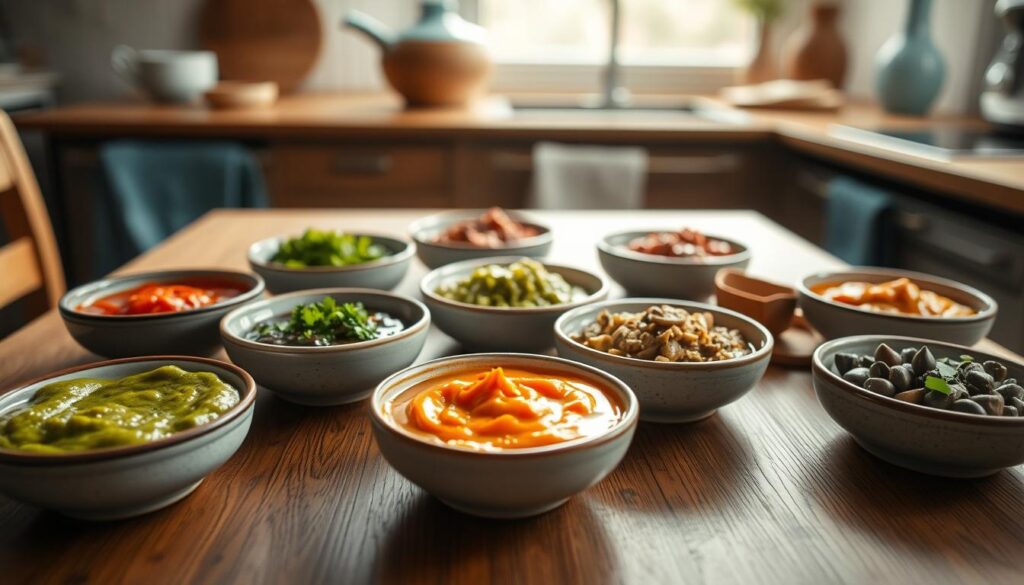
Homemade Sweet & Sour, Teriyaki, and Spicy Sauces
Sweet & sour becomes balanced when you mix 2 tablespoons sugar with equal parts rice vinegar and orange juice. For teriyaki, simmer soy sauce with minced ginger and a touch of honey—skip store-bought versions loaded with corn syrup. Spicy fans: blend chili paste with lime and a pinch of brown sugar for heat that complements rather than overwhelms.
Three sauce hacks I use weekly:
- Mash avocado with Greek yogurt for creamy texture without heavy calories
- Add grated ginger to bottled sauces to revive bland flavors
- Roast vegetables before blending into marinades for deeper complexity
One parent shared her breakthrough: “Measuring sugar with actual tablespoons stopped my dressings from tasting like candy syrup.” Small adjustments create big impacts. Try swirling sauces into meal components separately—this preserves texture and lets eaters customize their heat or sweetness levels.
Your fridge door holds endless possibilities. Whisk miso into peanut butter for umami depth, or thin tahini with lemon juice for bright drizzles. As I tell my cooking class students: “Sauces aren’t afterthoughts—they’re the conductors of your flavor orchestra.”
Quick Egg Roll in a Bowl Recipe for Busy Days
Let me confess: I’ve burned through more takeout menus than I care to admit. That changed when I perfected this deconstructed egg roll—all the crunch without the grease. It’s become my emergency dinner for nights when even microwaving feels ambitious.
Ingredient Substitutions and Enhancements
Ground chicken brings lean flavor absorption, but shrimp works beautifully for pescatarians. Try this comparison:
| Protein | Cook Time | Flavor Pairing |
|---|---|---|
| Ground chicken | 6-8 minutes | Ginger + sesame |
| Shrimp | 3-4 minutes | Lime + chili |
| Crumbled tofu | 7 minutes | Tamari + garlic |
Boost texture with shredded cabbage or water chestnuts. A client once texted, “Adding extra fresh pepper made my version taste like the food court favorite—but better!” Don’t shy away from bold spices.
Cooking Techniques for a Crisp Texture
Heat control is everything. Use these steps:
- Preheat your skillet until oil shimmers
- Cook proteins in single layers—no overcrowding
- Toss veggies just until edges brown
One time-saving trick: batch-cook components separately. Store them chilled, then quickly reheat with a splash of broth to revive crispness. This method cuts active cooking time to 15 minutes on hectic evenings.
Remember, this recipe thrives on improvisation. Swap coleslaw mix for shredded Brussels sprouts, or add pineapple for sweetness. As I tell my cooking class students: “Your wok is a playground, not a prison.”
15 Minute Chicken Power Bowls: Fast and Tasty
Balancing a toddler’s demands and a simmering pan revealed kitchen truths I now swear by. You don’t need hours to build bold flavors—just strategic moves. This method turns chaotic evenings into victories where everyone cleans their plate.
Creating a Savory Simmer Sauce
Start with your heaviest pan—cast iron works magic here. Crumble lean ground chicken into rippling oil. Let it sizzle untouched for 2 minutes to develop golden edges. That crust becomes your flavor foundation.
| Traditional Method | 15-Minute Hack |
|---|---|
| Separate sauce prep (10+ minutes) | Deglaze pan with broth + spices |
| Multiple pots | One-pan wonder |
| Simmer time: 20 minutes | Reduced sauce in 5 minutes |
While the chicken browns, whisk together:
- 2 tbsp soy sauce
- 1 tbsp rice vinegar
- 1 tsp grated ginger
Pour this mix into the pan after removing the chicken. Scrape up those browned bits—they’re flavor gold. Let it bubble until thickened, about 3 minutes. Fold in diced avocado off-heat for creamy contrast without overpowering.
One client’s feedback says it all: “I thought ‘quick’ meant bland. This changed my weeknight game.” Serve over prepped rice or greens. From pan to table in 15 flat—because time shouldn’t dictate taste.
Customizing Your Bowl Recipe for Dietary Needs
A new mom once told me her biggest struggle: creating meals her lactose-intolerant husband and gluten-free teen would both enjoy. We cracked the code by treating each bowl component like LEGO blocks—mix and match without starting over.
Start with your protein foundation. Swap ground beef for lean turkey in Mexican-inspired bowls. Need plant-based options? Try seasoned lentils or crumbled tempeh. As food blogger Kate from Cookie and Kate advises: “Roasting transforms even simple beans into craveable stars.”
| Dietary Need | Protein Swap | Carb Swap | Flavor Tip |
|---|---|---|---|
| Low-Carb | Shredded chicken | Zucchini noodles | Add toasted pine nuts |
| Dairy-Free | Ground chicken | Quinoa | Use tahini dressing |
| High-Fiber | Black beans | Brown rice | Toss with lime zest |
Macro adjustments become simple when you understand ingredient roles. Ground chicken (lower fat) works better in Asian-style bowls where sauces carry flavor. Ground beef shines in hearty chili bases—its richness balances leafy greens.
Three rules from my meal prep playbook:
- Prep components separately for easy assembly
- Use color-coded containers for different diets
- Double-check seasoning when swapping proteins
As Budget Bytes founder Beth shows, successful recipe tweaks require curiosity, not perfection. Your bowls should adapt to life’s changes—whether training for a marathon or navigating food sensitivities. The real secret? Your taste buds call the shots.
Nutritional Breakdown and Calorie Insights
Understanding the numbers behind your meals can turn guesswork into strategy. Let’s explore how simple tweaks impact your energy levels and satisfaction—without complicated math.
Macro-Friendly Measurements and Tips
Take the Honey Harissa Ground Chicken Bowl: 450 calories, 38g carbs, and 18g fat per serving. Swap jasmine rice for cauliflower rice? You’ll slash carbs by 22g while keeping bold flavors intact. Here’s how popular combos stack up:
| Bowl | Calories | Carbs | Fat |
|---|---|---|---|
| Chile Lemon Rice | 420 | 45g | 14g |
| Spicy Shrimp & Quinoa | 380 | 32g | 16g |
| Lentil Power Bowl | 410 | 48g | 12g |
One client realized her midday slump vanished when she reduced added sugar in dressings. “Using lime juice instead of honey cut 8g sugar per bowl,” she shared. Small changes create big impacts.
Smart swaps for calorie control:
- Replace avocado oil spray with measured teaspoons (saves 40 calories)
- Use Greek yogurt instead of sour cream (halves fat content)
- Roast veggies without oil, then toss with 1 tsp sesame seeds
Track portions using tablespoon measures—not guesswork. Apps like MyFitnessPal simplify logging. As Eating Bird Food demonstrates, clarity breeds consistency. Your meals should fuel ambition, not drain it.
Storing and Reheating Your Meal Prep Bowls
Nothing kills meal prep momentum faster than opening a container of soggy veggies or rubbery chicken. Through trial and error (and a few tragic fridge discoveries), I’ve nailed down storage methods that keep components vibrant for days.
- Use glass containers with tight seals—plastic absorbs odors
- Layer dressings/sauces at the bottom, greens on top
- Store crispy elements (nuts, chips) separately in snack bags
When reheating, your tools matter. Microwaving? Add a damp paper towel over grains to prevent drying. For stovetop revival, heat your skillet to medium before adding proteins and veggies—this restores texture in minutes.
| Method | Time | Best For |
|---|---|---|
| Microwave | 2-3 min | Single servings |
| Skillet | 5-7 min | Crispy revivals |
Prepping ahead time? Assemble bowls without wet ingredients. A client once shared her genius move: “I keep pre-portioned dressing cups in the door—just grab and drizzle before eating.”
For maximum convenience, divide components using bento-style containers. This lets you mix flavors without cross-contamination. Need fresh inspiration? Try these simple recipes for reassembly:
- Toss chilled grains with hot broth for instant “fried rice” texture
- Top reheated proteins with quick-pickled onions
- Add fresh herbs post-reheat for brightness
Remember: proper storage isn’t just about safety—it preserves nutrients and flavor layers you worked hard to build. Your future self will thank you.
Meal Prep Hacks for a Healthier Lifestyle
I once forgot to prep veggies for a client’s event and spent hours julienning carrots mid-service. Now? I keep frozen stir-fry blends and pre-chopped rainbow slaw in my freezer. Smart shortcuts turn chaotic weeks into smooth sailing—here’s how.
Prepping Ingredients in Advance
Batch cooking thrives on strategic shortcuts. Try this comparison:
| Traditional Prep | Streamlined Hack |
|---|---|
| Daily veggie chopping | Pre-cut frozen peppers |
| Raw marinating | Pre-seasoned ground chicken |
| Cooked rice storage | Frozen cauliflower rice |
One parent shared her breakthrough: “Buying pre-spiralized zucchini saved 15 minutes nightly.” Use your grocery store’s salad bar for small-batch ingredients like diced onions or shredded carrots.
Maximizing Freshness and Flavors
Store components smartly:
- Layer grains below proteins to prevent sogginess
- Toss fresh herbs with a damp paper towel before refrigerating
- Freeze sauces in ice cube trays for portion control
Revive meals with bright accents. A squeeze of lime or sprinkle of chili flakes transforms leftovers. For ground beef bowls, try mixing in roasted cherry tomatoes during reheating—their acidity cuts through richness.
Want more inspiration? Explore these flavor-packed recipes that work beautifully with pre-prepped ingredients. And hey—share your best kitchen hack below! Let’s build a treasure trove of time-saving tricks together.
Conclusion
We’ve journeyed from Sunday planning to Friday reheating—and here’s what matters most. Balanced meals don’t require chef-level skills or endless hours. With smart ingredient swaps and batch-friendly recipes, you’re building a toolkit for real-life success.
Think of your skillet as the MVP here. Whether searing ground chicken or roasting cauliflower rice, those golden-brown edges transform basic components. Your freezer becomes a flavor bank—store prepped sauces in ice cubes or freeze roasted veggies for instant texture.
Three truths I’ve learned through countless meal prep sessions:
- Great bowls balance crunch, creaminess, and zing
- Proper storage keeps components vibrant for days
- Experimentation turns routine into adventure
Now it’s your turn. Swap that sauce, try riced broccoli instead of quinoa, or add pickled onions for brightness. Share your creations with fellow cooks—we all thrive on fresh ideas. Remember, the goal isn’t perfection. It’s about crafting meals that fuel both body and joy, one delicious bite at a time.
Got a game-changing combo or kitchen hack? Drop it below! Let’s keep this conversation—and our taste buds—buzzing.

